Abstract
The event management in sports organizations is a matter of strict necessity and actuality due to the development worldwide sporting phenomenon. This research topic is of great interest to professionals and current sports structures as systems because organizations must continually adapt to multiple and unpredictable influences of external or internal factors. The introduction of scientific management concepts within the sports structures in one step is relatively new and insufficiently substantiated. Developing conceptual edge detection in the field of sports management and managerial methods and techniques is leading to performance in sports organizations. We believe that the use of scientific management level sports organizations enhances their activity, which increases the efficiency of organizing sport activities and boost their results. The research approach was used as research tools based on questionnaire survey. The results of scientific research can be useful for supplementing the theoretical basis in the field of sports management from the perspective of sports organizations to optimize the management process. Using questionnaire based survey we identified respondents' opinions about the management system manifested in sports organizations investigated. This research can be an opportunity for those interested in exploring sports management, moreover, the only means of scientific approach in the management of sports organizations. Event management scientifically sound lacking determines gaps in leadership sport structures. By the managerial intervention will optimize the work done in sports organizations to achieve the planned objectives.
Keywords: Managementmanifestationsport organization
Introduction
Sport is a social phenomenon which, over time, had a huge impact on society and which allowed the
formation and socialization of individuals, leading ultimately to the overall development of society
(Mihăilescu, 2008, p. 85).
Harnessing talent psycho-motor performance outstanding is a complex process that requires
multiple solutions based training information, experiments, research and studies (Cucui, 2015, pp. 230-
235).
Sports management is a multidimensional concept, considered to be a set of tools to analyse various
disciplines to understand how sports organizations are managed. The multidimensionality of sport
management is due to the evolution of contemporary science, on the one hand and complexity of
knowledge, on the other hand.
The concept of physical education and sports management will help to increase the area of
knowledge in this field and also to maximize athletic performance in organizations (Cucui, 2013a).
The management of sports organizations, like any organization, is a complex process that generates
many questions to legal action to make these effective organizations. Sports organizations are a system
of people and action, placing the question of why people act. M. Crozier, E Friedberg believes that
organizational action cannot pass a reflection on actors that generate this action (1995).
Management issue in football clubs is one of strict necessity and actuality because football
development worldwide phenomenon (Cucui, 2013b).
For the activity within an organization to be more agile, flexible, adaptable and creative requires a
manager with high potential to achieve coordination at a higher quality level. The diagnosis requires the
activity of a sports organization is undoubtedly methodological advantage of using a systemic approach.
The management of sports organizations preparing a decision can be made by using the SWOT
analysis, which provides information necessary internal and external manager choosing the best options
for developing the strategy (Cucui, 2013c).
System management in sports organizations include several components that differ according to the
nature and characteristics of the methods they use and are organizational subsystem, information
subsystem, decision subsystem, methodological and informational subsystem.
Sports efficiency of organization is given by way of achieving the goals of interaction and operation
of its subsystems taking into account the external factors that can intervene in this process.
Management of sports organizations currently cannot be conceived without the use of scientific
methods and techniques to enable effective and rational use of resources, boosting staff and managers
to accurately assess outcomes, optimize decision-making and management of all functions.
Promoting promotional policies in sports management can be achieved by extrapolating information
from economic and adapt them to the particularities of sport likely to lead to shaping and promoting
techniques, processes and management systems designed to generate positive effects for both sports
organization and its external environment.
Sports management involves theoretical concepts are generally valid, but must be applied contingent
vision, situational and cultural contexts adapted to the particularities existing territorial and
organizational plan.
Materials and Methods
The research is presented as a set of activities carried out in a systematic way for collection and
processing of data (information) in a particular field of activity, and use the findings in order to achieve
progress in the knowledge and practice that domain.
After the organization of work, we believe that this research is one of determination and verification.
Assuming that to develop sports organizations need a scientific management, I analysed the
management exercised in sports clubs in the South - Muntenia.
The main method of quantitative sociological investigation questionnaire was used. This was the
distribution of a questionnaire on the evaluation process manifested in the management of sports
organizations in the South-Muntenia.
To achieve the research was developed a questionnaire that included items closed, focus on process
management manifestation of clubs investigated.
Results
Preliminary analysis and interpretation of research results was done from the questionnaire on the
event management process. Responses were given on a scale of ratings from 1 (the minimum) and 5
(maximum level). Respondents chose one of the values found on the response scale for each item.
Ratings of the response scale are the strength and show how survey participants regarding different
aspects of the organization. Data were pooled and processed for the analysis of quantitative.
Under item no. One which focused on "management training" - that was analysed was obtained
chart. 1, which is in fact the expression responses of study participants. From the chart below, notice
that a management training subjects by between II, III and IV, to a greater extent. This highlights the
low interest in training in this area, observing the small number of those with thorough training
management (3), but that 2 subjects admitted that they specialized studies.
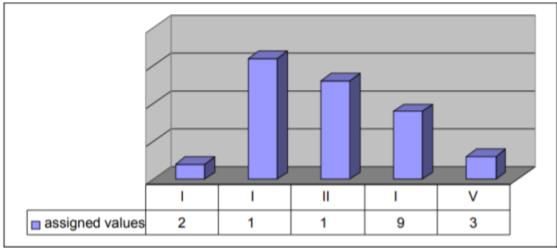
The second dimension studied refers to "work plan rigorously and systematically". As shown in the
chart. Two survey participants plan their time rigorously and systematically, this being marked values
III and IV who obtained the best scores. Thus we are dealing with representatives of sports
organizations who appreciate the real value of time.
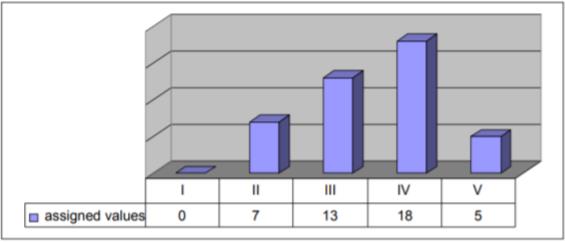
For item three ie "activities designed is performed," study participants argue that perform the
proposed activity somewhat, this observing and chart. 3. The vast majority of cases opting for values
III and IV, which shows that the projected activities are not fully met. There is a backup from the
respondents on this issue because the maximum value V chose a small number of participants.
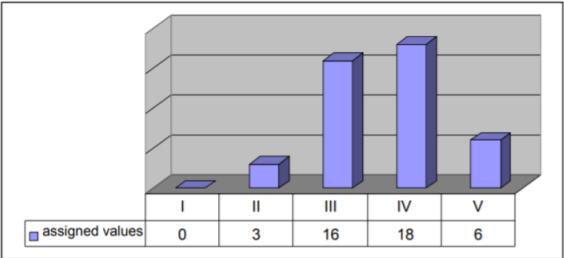
Under item no. 4 'compliance with existing resources clearly defined "Respondents some
reservations in saying this. From the chart 4, we observe increased share value attributed III. This
proves that sports organizations shortcomings in establishing clear objectives, probably due Existing
resources, these being undervalued or overvalued often.
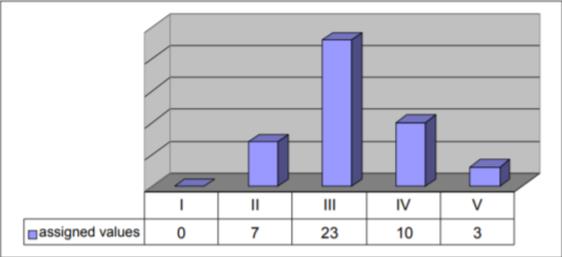
Size five on "employees' contribution in the design and decision making", respondents emphasized
that he takes decisions and chooses little on employee involvement in decision-making and advisory
factor. Thus the chart. May we see the results on the values attributed II, III and IV, which are
representative of this dimension and marks a defining feature of which is that the vast majority of
people in the leadership department does not consult with employees in decision making.
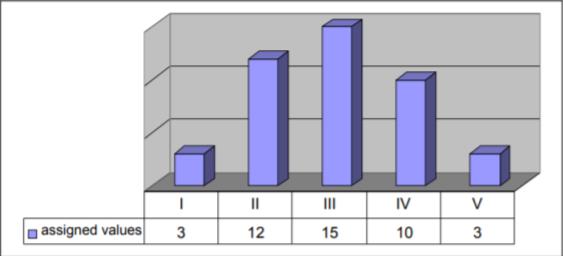
For item "retrieve tasks related to employees' results express that the persons responsible for its
management employees assigned certain tasks. From the chart 6 highlights the responses of study
participants who opted for the values of size III and IV, indicating a data rate of over 50% channelled
these values. This is particularly important in the field of organizational and is based on a number of
aspects of the work itself on the one hand, methodological aspects and not least psychological. In fact,
the results highlighted by the study highlights a serious problem of the Romanian sport namely the lack
of specialized organizational manager of the organization.
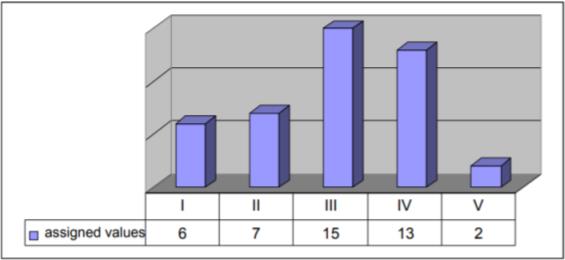
At point seven, "the planning control procedures", the results are obvious in terms of dialogue with
subordinates regarding certain procedures to verify and control. Chart no. 7 significant outcome
highlights the value attributed IV, this indicating that about half of the respondents have determined
how to control subordinates.
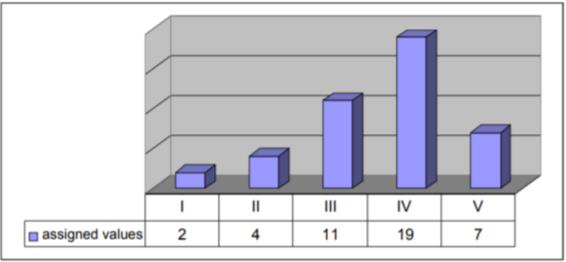
Discussion
Promoting a scientific management positions in sports organizations and management teams to
devise development strategies and monitor their implementation activities should constitute the basis
for each manager and the organization as dynamic factor of all organizational activities.
Conclusions
In the context outlined by Interviewees looming reorganization proceedings in sports organizations.
Amid lack of vision and lack of even a specialist in the management of sports in sports
organizations analysed, was installed some self-sufficiency, even convenience opposite the application
of scientific management level sports organization.
Management of sport organizations in terms of a scientifically based insufficient management can
cause syncope manifested in the work and performance.
References
- Crozier, M., & Friedberg, E. (1995). Acteur et le systeme. Paris: Editions du Seuil.
- Cucui, G.G. (2015). Means used to streamline attack on the level of a junior football team. Revista MARATHON, 7(2), 2015.
- Cucui, G.G. (2013a). Study on evaluation management system football clubs in South-Muntenia. 6th Annual International Conference “Physical Education, Sports and Health”, Piteşti, România.
- Cucui, G.G. (2013b). Research on the diagnosis management of sports organizations. 6th Annual International Conference “Physical Education, Sports and Health”, Piteşti, România.
- Cucui, G.G. (2013c). Study on evaluation management szstem football clubs in South-Muntenia. 6th Annual International Conference “Physical Education, Sports and Health”, Piteşti, România.
- Mihăilescu, N. (2008). Concepte specifice managementului modern în organizaţiile sportive. Pitesti: Editura Universităţii din Piteşti.
Copyright information

This work is licensed under a Creative Commons Attribution-NonCommercial-NoDerivatives 4.0 International License.
About this article
Publication Date
04 October 2016
Article Doi
eBook ISBN
978-1-80296-014-3
Publisher
Future Academy
Volume
15
Print ISBN (optional)
-
Edition Number
1st Edition
Pages
1-1115
Subjects
Communication, communication studies, social interaction, moral purpose of education, social purpose of education
Cite this article as:
Cucui, G. G., & Cucui, I. A. (2016). Event Management Process within the Sports Structures. In A. Sandu, T. Ciulei, & A. Frunza (Eds.), Logos Universality Mentality Education Novelty, vol 15. European Proceedings of Social and Behavioural Sciences (pp. 261-267). Future Academy. https://doi.org/10.15405/epsbs.2016.09.34

